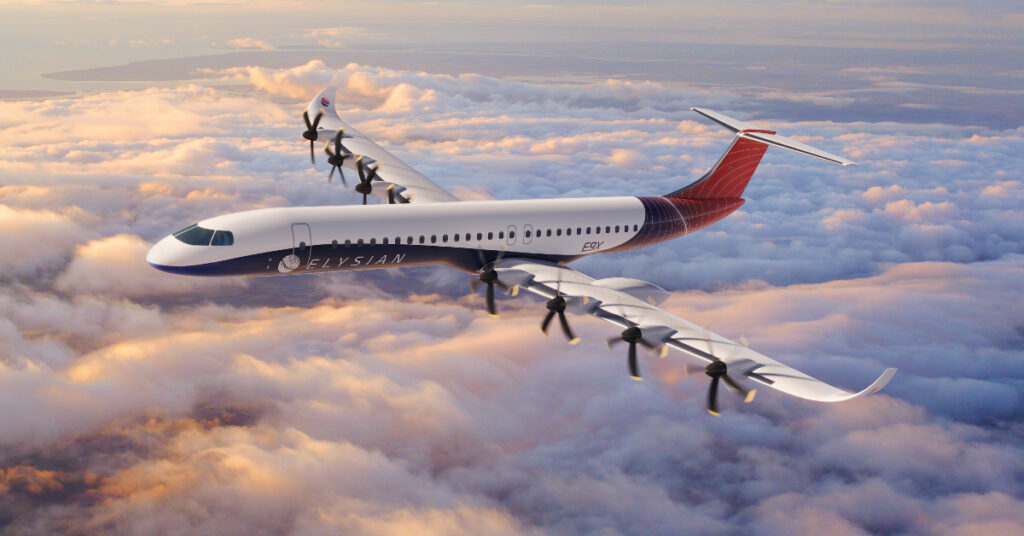Delft-based Elysian, an aerospace startup, on Wednesday, announced new research findings that demonstrate the viability of battery-electric air travel on a larger scale, in collaboration with Delft University of Technology.
Founded by Rob Wolleswinkel, Reynard de Vries, and Daniel Rosen Jacobson and backed by Panta Holdings and Caravelle, Elysian is developing the first-ever 90-passenger, battery-electric aircraft with the potential to travel 800 km.
Battery electric flight
According to Elysian, revised calculations, based on new design principles, signal a paradigm shift in the potential of battery electric flight.
It involves a 90-passenger, battery-electric aircraft capable of travelling 800 km with a pack energy density of 360 Wh/kg.
Based on these findings, Elysian was established to continue the development of this aircraft, aiming to become operational by 2033.
Traditionally dismissed as impractical for mainstream aviation due to limitations in capacity and range, battery-electric flying is now a challenging convention.

Challenging existing notions
Two scientific papers, ‘A new perspective on battery-electric aviation, part I and II,’ authored by Rob Wolleswinkel, Reynard de Vries, Maurice Hoogreef, and Roelof Vos, challenge existing notions.
The first scientific paper re-examines assumptions that have led to the current perception of limited applicability for battery-electric aircraft.
Additionally, it presents new parametric designs for a feasible battery-electric aircraft that can carry 40-120 passengers and can fly up to 1000 km cruise range.
“Contrary to common belief, large battery-electric aircraft can carry much more energy and are aerodynamically more efficient than originally assumed,” says Elysian Co-founder and Chief Technology Officer Rob Wolleswinkel.
“Instead of a turboprop aircraft, we considered first-generation narrow-body jets as a reference point. While these jets were fuel-inefficient, they were designed for long ranges and carried a high energy mass relative to the total aircraft mass. That served as inspiration for our electric aircraft design,” adds Wolleswinkel.
The second research paper outlines the design of a 90-passenger battery-electric aircraft.
This aircraft can travel up to 800 km on battery power alone, assuming a battery pack energy density of 360 Wh/kg.
It meets the required specifications through various design choices, which include:
- Batteries are placed in the wing to lighten the aircraft, which puts the load where the lift is and uses the space in the wing box.
- Distributed electric propulsion (DEP) can reduce the propeller diameter, enabling a low-wing configuration with a wing-mounted landing gear. It leads to lighter landing gear and fuselage.
- A larger wingspan and a smaller body than a conventional aircraft can significantly increase aerodynamic efficiency without advanced technology.
- Foldable wingtips optimise aerodynamic performance and fit within gate span constraints due to the large wingspan.
- A gas-turbine-based “reserve energy system” provides energy to the batteries and motors during diversion or loitering. The reserve energy system is designed to cover reserves, not to extend the mission range.
Advantages of battery-electric aircraft
Flights up to 1000 km long currently make up 50% of all scheduled flights worldwide. However, they also contribute to about one-fifth of all aviation-related CO2 emissions.
The introduction of battery-electric aircraft for short-haul flights has the potential to reduce the aviation industry’s climate impact significantly. This design can achieve up to five times higher efficiency per passenger kilometre than hydrogen or SAF-powered aircraft.
It matches the energy efficiency of an average electric car with 1.2 passengers. Moreover, this aircraft has a high passenger capacity and presents an economically viable and competitive alternative to conventional aircraft.
Elysian is collaborating with leading institutes like Delft University of Technology, Twente University, Royal Netherlands Aerospace Centre (NLR), and Deutsches Zentrum für Luft- und Raumfahrt (DLR) to solve these questions before finalising a design.
Joris Melkert, Senior Lecturer of Aerospace Engineering at the Delft University of Technology, says, “We expect Elysian to make a significant contribution to discovering the boundaries of battery electric flying by taking a refreshingly new look at the combination of technology and design. We wholeheartedly support their systematic and scientific approach and look forward to their solutions to the technological challenges ahead.”
Read the orginal article: https://siliconcanals.com/news/startups/elysians-90-passenger-e-aircraft/


